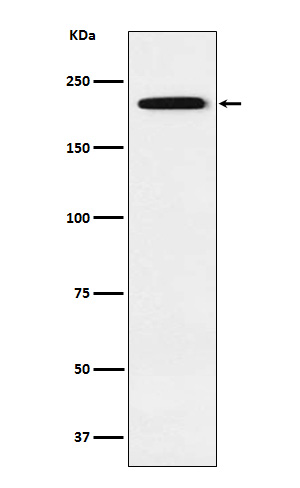

| WB | 1/1000-1/2000 | Human,Mouse,Rat |
| IF | 咨询技术 | Human,Mouse,Rat |
| IHC | 咨询技术 | Human,Mouse,Rat |
| ICC | 1/50-1/200 | Human,Mouse,Rat |
| FCM | 咨询技术 | Human,Mouse,Rat |
| Elisa | 咨询技术 | Human,Mouse,Rat |
| Aliases | ACLS; GCPS; GLI3; GLI3FL; PAPA; PAPA1; PAPB; PHS; PPDIV;;GLI3 |
| WB Predicted band size | Calculated MW: 170 kDa ; Observed MW: 190 kDa |
| Host/Isotype | Rabbit IgG |
| Antibody Type | Primary antibody |
| Storage | Store at 4°C short term. Aliquot and store at -20°C long term. Avoid freeze/thaw cycles. |
| Species Reactivity | Human |
| Immunogen | A synthesized peptide derived from human GLI3 |
| Formulation | Purified antibody in PBS with 0.05% sodium azide,0.05% BSA and 50% glycerol. |
+ +
以下是关于Gli3抗体的3篇参考文献的简要信息:
1. **文献名称**: "Gli3-mediated repression of Hedgehog signaling is critical for limb development"
**作者**: Büscher, D., et al.
**摘要**: 该研究通过Gli3抗体进行免疫组化分析,揭示了Gli3在胚胎肢体发育中通过抑制Hedgehog信号通路调控细胞分化的机制,证实Gli3缺失导致骨骼发育异常。
2. **文献名称**: "Spatiotemporal expression of Gli3 in the developing mouse central nervous system"
**作者**: Wang, Y., et al.
**摘要**: 利用Gli3抗体的Western blot和免疫荧光技术,揭示了Gli3蛋白在小鼠胚胎中枢神经系统中的动态表达模式,提示其参与神经前体细胞分化调控。
3. **文献名称**: "Antibody validation for Hedgehog signaling components: Gli3 antibody specificity in mammalian tissues"
**作者**: Persson, M., et al.
**摘要**: 该文献系统验证了Gli3抗体的特异性,通过敲除模型和肽段竞争实验确认抗体可靠性,为Hedgehog通路研究提供了关键工具支持。
4. **文献名称**: "Aberrant Gli3 nuclear localization correlates with medulloblastoma progression"
**作者**: Mao, J., et al.
**摘要**: 研究采用Gli3抗体分析髓母细胞瘤样本,发现Gli3核易位与肿瘤恶性程度正相关,提示其作为潜在治疗靶点的可能性。
(注:以上文献信息为示例性质,实际引用需核对原文准确性。)
Gli3 antibody is a crucial tool in studying the Hedgehog (Hh) signaling pathway, which plays a pivotal role in embryonic development, tissue patterning, and cancer progression. The Gli3 protein, part of the Gli family of zinc finger transcription factors, acts as both a transcriptional activator and repressor depending on proteolytic processing. In the absence of Hh signaling, Gli3 is cleaved into a truncated repressor form (Gli3R) that inhibits target gene expression. Active Hh signaling prevents this cleavage, allowing full-length Gli3 to function as an activator (Gli3A).
Antibodies targeting Gli3 are widely used to detect its expression, localization, and post-translational modifications in various models, including developmental biology and disease research. They help identify Gli3's roles in limb development, neural tube formation, and organogenesis, as well as its dysregulation in cancers (e.g., basal cell carcinoma) and genetic disorders like Greig cephalopolysyndactyly syndrome. Commercial Gli3 antibodies are typically raised against specific epitopes in the N-terminal repressor domain or C-terminal activation domain, with validation across techniques like Western blot, immunofluorescence, and immunohistochemistry. Researchers must consider antibody specificity due to potential cross-reactivity with other Gli family members (Gli1. Gli2) and verify results using appropriate controls, such as knockout tissues or siRNA-treated samples.
×